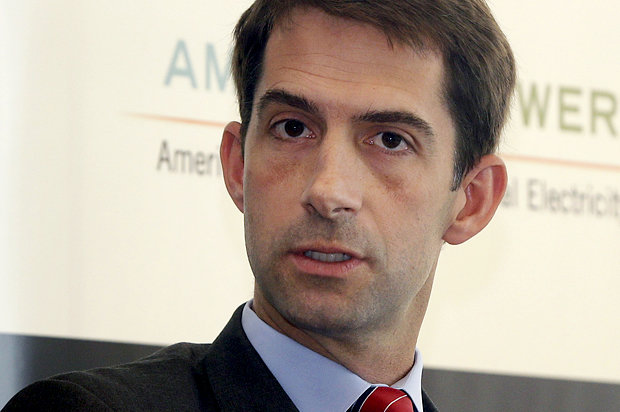Tom Cotton: What’s the reason for AIPAC’s $ 4.5 million support for young senator?

In recent months, news sources in the United States have reported the possibility of the appointment of the young Arkansas senator, Tom Cotton, as the Director of the Central Intelligence Agency (CIA), or the U.S. National Security Advisor.
40-year-old Cotton is considered the youngest American senator, and, of course, many of the active Israeli lobbies in the United States count on his role-making in American political-security equations. In April 2015, the New York Times admitted that the Zionist lobbies’ financial support for Tom Cotton was much higher than that for other Republican senators.
The New York Times has announced that the amount of this financial assistance was around $ 2 million.This is while some informed sources in the U.S. say the AIPAC lobby has spent $ 4.5 million for Tom Cotton to insure his winning against “Mark Pryor” in the 2014 Senate elections.
In August 2013, Tom Cotton, with AIPAC’s green light and support, entered the political scene against former Arkansas Senator Mark Pryor. In the meanwhile, some prominent personalities and politicians in the Republican Party of America, such as “Marco Rubio” and “Mitt Romney”, by the order of AIPAC leaders, had also fully supported Tom Cotton.
Eventually, Cotton won 56.5% of the vote (against 40 percent of Pryor vote), and thus defeating his rival, entered the Senate. However, the main question is, what’s the reason for this huge, unnatural support of Zionist lobbies, AIPAC in particular, for Tom Cotton? In other words, what capacity did these organizations and lobbies see in Tom Cotton, that they have been willing to use their full power to help him enter the U.S. Senate? Is AIPAC’s goal of such widespread support merely Cotton’s gaining the Arkansas seat in the Senate? The answer to this question is negative.
A security analyst in the United States who didn’t want his name to be revealed told our reporter:
“Given the young age of Cotton compared with other American politicians, and his commitment to Tel Aviv, the Israeli authorities have tried to use him as an influential factor in U.S. domestic security and foreign policy. AIPAC has always named Cotton as a trend-making agent in its calculations. This Zionist lobby’s recent attempts for Cotton’s presence as the CIA Director can also be analyzed in the same vein.”
This analyst added:
“It is likely that the AIPAC lobby would ask Cotton not to run for the Senate in the congressional elections in 2018, so that he can be employed by the U.S. government as the National Security Advisor, or CIA Director in Trump’s government.”
In January 2015, Tom Cotton played an important role in leading and managing the anti-JCPOA movement in the U.S. Senate in the midst of nuclear talks between Iran and the members of the P15+ 1. On March 8, 2015, Senator Cotton wrote and sent a letter to Iranian leaders. In this letter, it was insisted that any nuclear deal without the approval of the U.S. Congress would only be valid until the end of Obama’s presidency in 2017, and the next president may easily cancel it. Another 46 Republican senators also signed the letter.
The existing evidences suggests that such a letter was ordered by the direct order of the AIPAC lobby, and was designed to negatively influence the negotiation process. However, Tom Cotton’s commitment to the AIPAC lobby, and beyond that to Israel, is much more than that.
Accordingly, Cotton is consulting AIPAC before making any decision in the field of U.S. domestic and foreign policy, and asks for the views of the lobby’s leaders. Even in cases which AIPAC doesn’t express its views on critical issues to American senators, Cotton has the duty to indirectly impose AIPAC’s stances on senators and even on key members of the House of Representatives. It is not without a reason that Tom Cotton is named as the main AIPAC piece in the Senate. For the thorough financial and political support of AIPAC leaders and Israeli authorities, Cotton has turned into Tel Aviv’s agent in the Senate (in the current period), and generally in the political scene of the United States.
Source: https://moderndiplomacy.eu/
